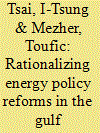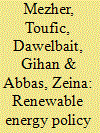| Srl | Item |
| 1 |
ID:
176810


|
|
|
|
|
| Summary/Abstract |
The Gulf Cooperation Council (GCC) states are undertaking a number of energy policy reforms to cope with challenges from geopolitical tension and oil revenue depletion. These reforms are, however, different from those implemented in the western world for post-oil transition. This paper analyzes post-reformed state control over energy assets and energy transactions to provide an institutional view on the rationality of GCC's unique reform approach. Our study shows persistent but re-programmed state dominance over the energy sector, with energy assets owned either by national oil companies, non-oil state-owned enterprises, or public-private-partnership (PPP) agents with state ownership; and energy transactions governed either by state regulation or PPP contracts in the absence of any market mechanism. This institutional setting may allow the authority to sustain the legacy rentier social contract by expanding state-controlled rent source from oil to non-oil revenue and replacing low-power energy subsidy with high-power state-provided jobs as the rent for transfer. This institutional motivation will ultimately jeopardize market-based reforms and large-scale carbon regulation in the region. We elaborate the theoretical implications and discuss near-term development of GCC's energy policy reforms under the institutional-alignment constraints.
|
|
|
|
|
|
|
|
|
|
|
|
|
|
|
|
| 2 |
ID:
111425


|
|
|
|
|
| Publication |
2012.
|
| Summary/Abstract |
Climate change and fossil fuel depletion are the main drivers for the recent focus on Renewable Energy (RE) resources. However, since the high cost of RE technologies is the main obstacle facing the diffusion of RE power generation, economic and political intervention is inevitable. In the United Arab Emirates (UAE) population and economic growth are the main causes of a sharp increase of energy demand. Two key related factors highlight the need to establish a RE sector: first the UAE has one of the highest carbon footprint in the world and second, the rate of depletion of its main energy generation resource - fossil fuel. In this study, we present a review of overall policies in sixty-one countries, focusing on their efforts to adopt RE resources in the power sector, and on their implementation of fundamental policies implemented. Furthermore, we investigate the applicability to Abu Dhabi UAE of the main RE policies implemented worldwide. As a result of our analysis, we recommend the implementation of a mixed policy of Feed-in-Tariff (FIT) and the Quota system for RE electricity generation in order for the UAE to meet its 7% target by 2020.
|
|
|
|
|
|
|
|
|
|
|
|
|
|
|
|